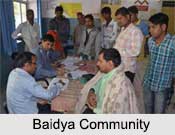 Baidya Community are traditionally physicians. Though small in number, they have also made a notable contribution to other aspects of life in India, particularly in West Bengal. They do not believe in amassing wealth and enjoy life as long as health and means permit. The Baidya is one of the most respected castes in Bengal ranking immediately after the Vaishyas, and before the Kayastha. They hold many distinctive positions compared to lower Hindu castes.
Baidya Community are traditionally physicians. Though small in number, they have also made a notable contribution to other aspects of life in India, particularly in West Bengal. They do not believe in amassing wealth and enjoy life as long as health and means permit. The Baidya is one of the most respected castes in Bengal ranking immediately after the Vaishyas, and before the Kayastha. They hold many distinctive positions compared to lower Hindu castes.
The Baidyas were distributed in 27 "sthans" beyond which no one could reside without loss of caste. The principal settlements were at Shinati, Chandam Mahal, Daspara, Puigrama, Karoria, Shendia, Itna, and Bhutta-pratap in Jessore, Poragachha in Bikrampur of West Bengal.
Origin of Baidya Community
Though the origin of the Baidya caste is unknown, history tells us that a Baidya dynasty ruled over Bengal during the 11th and 12th centuries. A Panini Sutra says that "vaidya" or "baidya" means one who has studied the Vedas. There are references to Brahmins who, after becoming conversant with the Vedas, studied Ayurveda and became Baidyas or physicians.
History of Baidya Community
There are a number of legends, which speaks about the history of the Baidya caste. Legend has it that the God of Medicine, "Dhanvantari" was born when the Devas and Asuras churned the ocean. He is considered to be an incarnation of Lord Vishnu and has four hands - in one hand he holds medicinal herbs and in the other hand he holds the text of Ayurveda. He was the first Baidya.
Society and Religion of Baidya Community
Talented, cultured and intelligent as a class, the percentage of literacy and education of the Baidyas is much higher than that of any other community in Bengal. The women are treated as equals and even in the days of Kulinism, when polygamy was practised, a Baidya hardly ever had two wives at a time.
Profession of Baidya Community
The Baidyas were originally the physicians. The practice of medicine is the proper profession of the Baidya community. In recent times, many Baidyas have joined the Brahmo Samaj, including some of the leaders. Some well-known Baidyas have achieved distinction as political and social workers, historians, authors, music directors, film directors, film stars, actors, dancers and singers.









